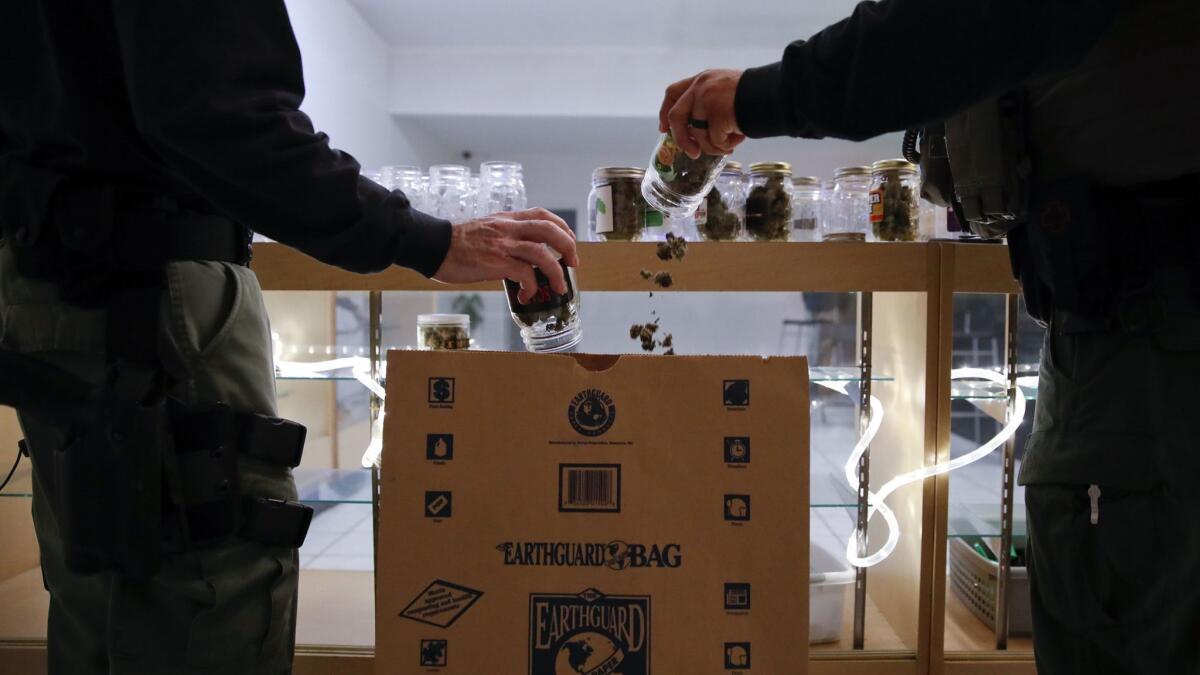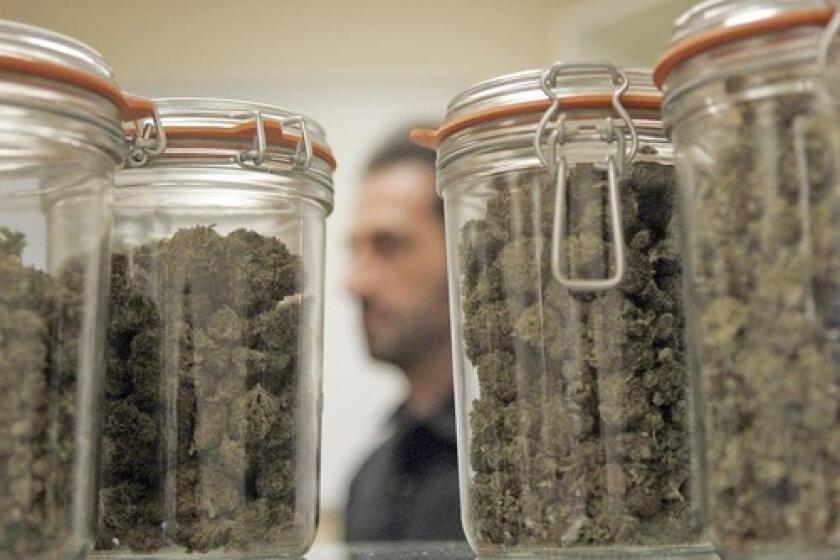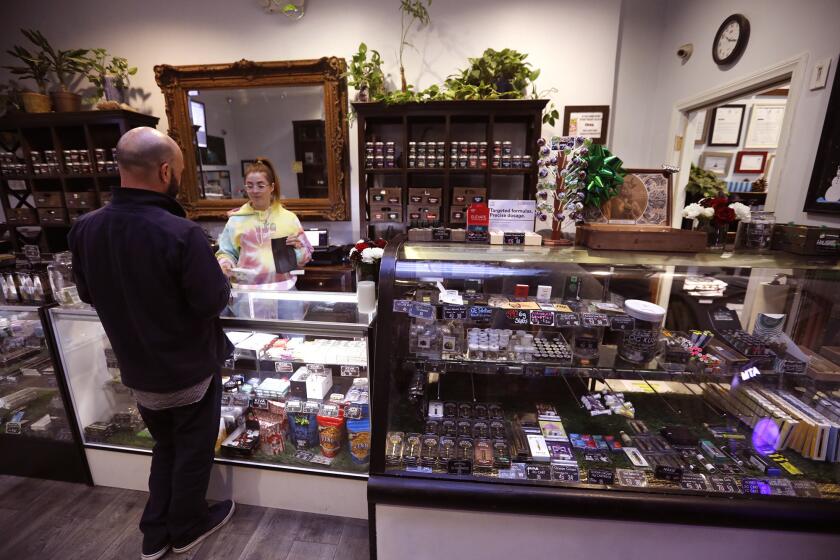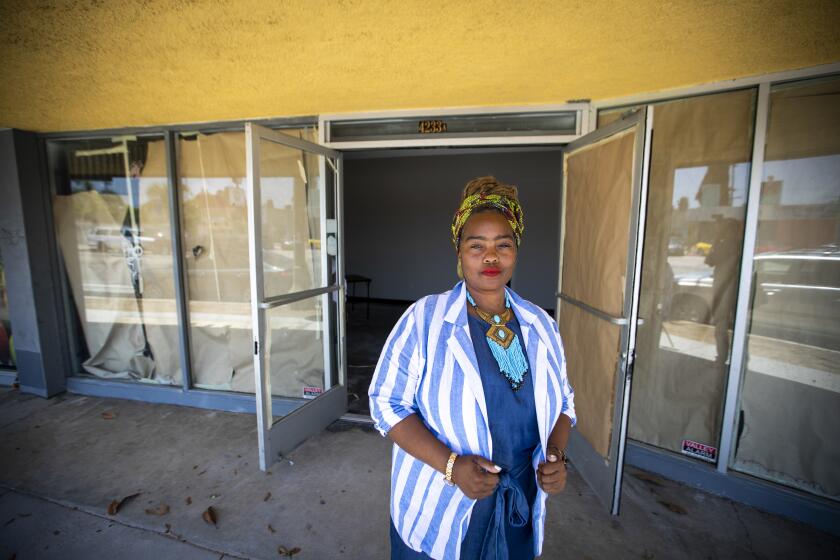Counterfeit cannabis products stoke black market for California weed
- Share via
Loudpack Farms had a multimillion-dollar problem.
An award-winning marijuana vape pen that was among the most profitable items sold by the cultivator had begun turning up at unlicensed weed dispensaries across California, its signature black box with the image of a red-eyed, stoned-out-of-his-mind playing-card king beckoning customers.
As it became clear that someone was counterfeiting the Kingpen brand, Loudpack Farms spent $2.5 million on new packaging and hardware last year to distinguish it from the knockoffs.
“The counterfeit market started replicating what we were doing almost as quickly,” said Daniel Corral, head of sales at the Monterey County firm.
Kingpen’s struggles are emblematic of a dilemma that California’s fledgling legal marijuana market is facing: a proliferation of counterfeit cannabis products that’s cutting into the profits and reputations of some of the state’s most popular legal brands while boosting sales in a thriving black market.
Fake vape pens and other knockoffs flooding the state are also raising safety issues: Like all products sold outside licensed dispensaries, counterfeit items are not tested for pesticides and other contaminants, leaving some concerned the items could pose health risks.
Weedmaps has been criticized for years for helping unlicensed dispensaries flourish as California struggled to permit businesses and regulate the industry. The app will no longer list unlicensed operators.
Licensed cannabis cultivators and businesses can’t distribute their wares to unlicensed dispensaries and delivery services without risking punishment from regulatory agencies, meaning any brand-name item that customers find in an illegal shop is almost certainly counterfeit.
“Any of those black market shops that you go into and have brands, that’s just like you going to the flea market on the weekend and getting your Prada shirt for $5,” said Ryan Jennemann, founder of THC Design, a Los Angeles cultivator that has also been a victim of counterfeiting. “That ain’t a Prada shirt.”
Although those in the cannabis industry differ on the severity of the problem, most agree counterfeit items are providing a boost to unlicensed dispensaries, which can sell marijuana at much lower prices than their legal counterparts by skirting state and local taxes.

Earlier this year, a Times report found there were at least 220 illegal cannabis dispensaries in Los Angeles, more than the number of licensed operators in California’s largest marijuana market. Though the state’s above-board weed businesses are on track to record more than $3 billion in sales this year, a rebound after 2018 revenues fell well below projections, that figure still lags far behind the $8.7 billion expected to be spent on unregulated cannabis in California in 2019.
The extent of counterfeiting remains unclear and has not been treated as a priority by regulatory and law enforcement agencies, many in the cannabis industry say.
Alex Traverso, a spokesman for the Bureau of Cannabis Control, said the agency was trying to discourage customers from shopping at unlicensed dispensaries and warn people about counterfeit products through a public awareness campaign this summer.
The BCC has received 38 complaints about counterfeit products through its online reporting portal since December 2017, Traverso said. The California Department of Public Health said it had received 21 similar reports since May of this year.
It is highly unlikely that either figure captures the breadth of the problem. Corral said he had filed dozens of complaints about fake Kingpen products with state agencies in the last two years alone. A spokesman for the parent company of Stiiizy, another popular vape pen in California, said he had found hundreds of instances of knockoff versions of its products being sold online.
In recent weeks, a Times reporter visited several unlicensed cannabis dispensaries in Wilmington, Koreatown, Hollywood and the San Fernando Valley, finding knockoff versions of vape pens and edibles produced by popular brands including Kushy Punch, Korova, Stiiizy and Kurvana.
One of the counterfeit items, a marijuana brownie bearing Korova’s logo, claimed to contain 1,000 milligrams of THC. It is illegal to sell an edible that contains more than 100 milligrams of THC in California.
A representative for Korova said it had received a complaint about the same fake product being sold in Southern California before, and asked where The Times had found the product so the company could investigate further. Multiple e-mails and calls seeking comment from Kushy Punch and Kurvana were not returned.
Daniel Yi, a spokesman for Stiiizy, said the company had done its best to educate customers about how to spot fraudulent merchandise and issued a number of cease-and-desist letters. But, Yi warned, dealing with counterfeiters is like a game of “whack-a-mole.”
“The fakes keep getting better and better,” he said.
California’s legal cannabis market is on track to post a record $3.1 billion in sales, but the black market is more than twice as large.
Law enforcement and regulatory agencies tasked with combating the state’s illicit cannabis market could not provide information about how popular brands in California are counterfeited. But those in the cannabis industry who have seen their wares faked say the process usually involves local black market growers placing their own products inside packaging manufactured outside the country.
Wesley Hein, head of compliance and government affairs for Mammoth Distribution in Woodland Hills, says vape pens that hold pre-filled disposable cartridges are the most commonly counterfeited item. Locals often will produce their own THC oil and then buy large quantities of packaging mimicking a popular brand from a foreign website. Alibaba, the massive online commerce hub based in China, is a haven for knockoff packaging, Corral said.
Other cultivators say those who run unlicensed marijuana grows will buy branded packaging online, then place their own flower inside and try to sell it to licensed dispensaries. In one instance, Jennemann said, a counterfeiter went to THC Designs’ website, downloaded the information there that showed how the cultivator’s marijuana had fared on state certification tests, and stuck the lab results on the side of the fake packaging to try to prove the authenticity of the product.
“The only way we found out about that was they sold it to a dispensary here in L.A. that we’re friends with,” he said.
Det. Vito Ceccia, who investigates illegal cannabis activity for the Los Angeles Police Department, said the department was more focused on shutting down illegal dispensaries than addressing counterfeit wares.
“This is uncharted territory for us,” he said. “Most of our field investigators don’t know the difference between a legitimate vaping pen and a knockoff pen.”
The department has had success in closing illegal dispensaries in the city, which limits the number of places counterfeit items can be sold. Ceccia said there were now fewer than 200 illegal dispensaries operating in Los Angeles, compared with nearly 300 at the beginning of the year.
Abcarian: Enticed by promises they could start cannabis companies, people of color are still waiting
To repair the harm done by the war on drugs, black people in low-income communities were told they’d get a leg up in the newly legal cannabis marketplace. But in LA, the process has been frustrating and slow.
But the LAPD’s approach focuses largely on cutting power and water to the properties where illegal activity takes place, rather than serving search warrants, which would lead to the seizure of counterfeit items. If the items aren’t seized, many of the fake products could wind up in circulation elsewhere.
Some cultivators have expressed concern that the counterfeit items are not only a threat to legitimate businesses, but also pose a risk to customer safety.
“You’re losing money and then you’re losing the trust of your customer base because, most likely, the stuff that’s in there is nowhere near the quality” of your product, said Brian Vecchio, a former cultivator who now works with a number of popular cannabis brands, including Chong’s Choice. “All these people have been smoking these vape pens that are super, super cheap. Chinese vape pens that have the heavy metals in them. Oils that have pesticides in them.”
Reports of people getting sick after consuming unregulated marijuana products in the state have been sporadic. Eight patients were diagnosed with acute respiratory distress syndrome in Northern California this summer after smoking marijuana from unlicensed “pop-up” dispensaries, said Nancy Gerking, assistant director of the Kings County Public Health Department.
In April, Los Angeles city officials also took action against an unlicensed dispensary in South L.A. that was allegedly selling pesticide-laced marijuana.
Gerking provided pictures of the vape pens linked to the reported sicknesses, but they did not appear to be counterfeit versions of any popular brands.
Some distributors believe issues with counterfeit products will fade away as California’s cannabis market matures and customers become better informed of the perils of shopping at unlicensed vendors.
“I think we’re past peak counterfeits. Somebody gets a vape cart that’s fake, so it leaks, doesn’t taste right, and what’s one of the first things they do? They go onto social media, and they post, and that warns other people,” Hein said.
Others are out of patience with state and local authorities. Corral said that Loudpack was once again rebranding its Kingpen vape in the hope of rendering counterfeiters obsolete, this time adding a code to the packaging that customers can scan on their phones to guarantee the product’s authenticity.
But the longer unlicensed operators and counterfeiters stay in business, Corral said, the harder it will be for legal shops to keep their doors open.
“There’s definitely a high level of frustration,” he said. “We see partners that are working really hard to stay licensed and to keep their lights on.”
More to Read
Sign up for Essential California
The most important California stories and recommendations in your inbox every morning.
You may occasionally receive promotional content from the Los Angeles Times.














